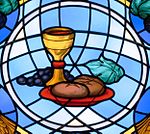
Back Eucharistická modlitba Czech Hochgebet German Eŭkaristia preĝo Esperanto Anáfora (liturgia) Spanish Anafora Finnish Anaphore (liturgie) French Anafora (liturgi) ID Preghiera eucaristica Italian Pangajabing Pisungsung (Pujakriya) JV 성찬기도 Korean
| Part of a series on the |
| Eucharist |
|---|
 |
The Anaphora,[a] Eucharistic Prayer[b], or Great Thanksgiving[1][c] is a portion of the Christian liturgy of the Eucharist in which, through a prayer of thanksgiving, the elements of bread and wine are consecrated. The prevalent historical Roman Rite from is called the "Canon of the Mass."
"Anaphora" is a Greek word (ἀναφορά) meaning a "carrying up", thus an "offering"[2] (hence its use in reference to the offering of sacrifice to God). (This sense is distinct from the usage of "anaphora" in rhetoric and linguistics to mean a "carrying back".) In the sacrificial language of the Greek version of the Old Testament known as the Septuagint, προσφέρειν (prospherein) is used of the offerer's bringing the victim to the altar, and ἀναφέρειν (anapherein) is used of the priest's offering up the selected portion upon the altar (see, for instance, Leviticus 2:14, 2:16, 3:1, 3:5).
Cite error: There are <ref group=lower-alpha> tags or {{efn}} templates on this page, but the references will not show without a {{reflist|group=lower-alpha}} template or {{notelist}} template (see the help page).
- ^ "Great Thanksgiving". The Episcopal Church. Retrieved 2024-04-26.
- ^ Liddell, Henry George & Scott, Robert. (1940). A Greek-English Lexicon (revised ed.). Retrieved July 9, 2005.
© MMXXIII Rich X Search. We shall prevail. All rights reserved. Rich X Search